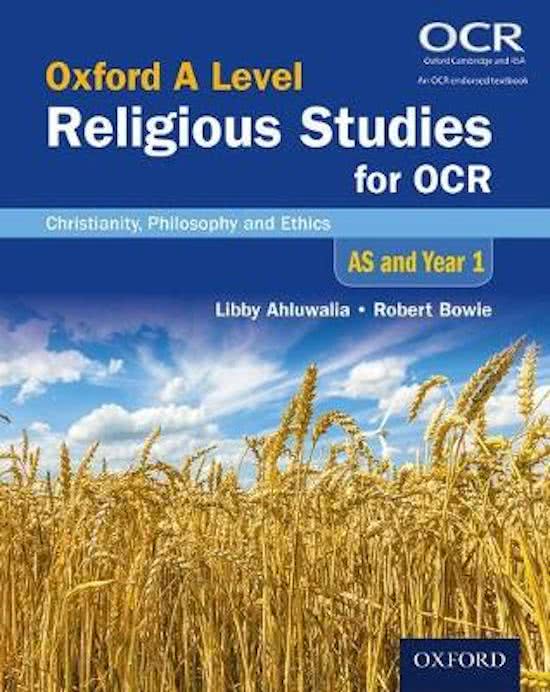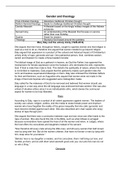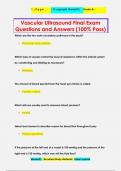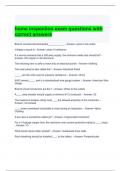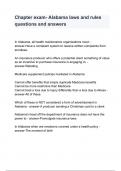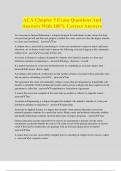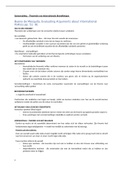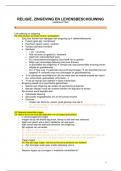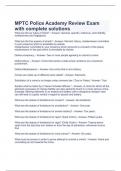Gender and theology
Post-Christian theology Abandons traditional Christian thought
Reform feminist theology Seeks to challenge traditional Christian thought
Davidic Messiah A Messiah based on the kingly military images of the Hebrew
scriptures
Servant king An understanding of the Messiah that focuses on service
rather than over lordship
Sophia Greek for wisdom
Thealogy Studying God based around the goddess
Mary Daly and the unholy trinity (1928-2010)
She argued that men have, throughout history, sought to oppress women and that religion is
used as a tool to do so, therefore she argued that women needed to go beyond religion.
Daly argued that oppression is a product of the cultural and historical impact of Christianity’s
unholy trinity of rape, genocide and war. One patriarchal person, God, combines sexism,
racism and classism to create a three-headed monster.
The biblical image of God as a patriarch in heaven, as God the Father, has spawned the
mechanisms for female oppression since the husband, who dominates the wife, represents
God. If God is male then male is God. This distorts the spirituality of nature, where the divine
is not limited to maleness. Daly argued that the patriarchy makes such gender roles the
norm and bestows supernatural blessings on them. Daly also criticised the Christian fathers
for their anti-feminism, such as Augustine who argued that women were not made in the
image of God and Aquinas who suggested were misbegotten males.
Daly called for the maleness of God to be removed and believed that women should use
language in a new way since the old language was androcentric/male-centred. She was also
critical of situation ethics since it is an individualistic ethic, which denies the communal
aspect for women to be truly liberated.
Rape
According to Daly, rape is a symbol of all violent oppression against women. The leaders of
society use culture, religion, politics, and the media to erase female power and imprison
women who have forgotten the reality of the gross inequality that she calls ‘gynocide’ and
have become divided against each other. She also described arm chair rapists who enjoy
stories of rape through porn.
She argued that there was a connection between rape and war since war often leads to the
rape of women. She also found this link in the Bible, such as when Moses is enraged
because commanders have spared the lives of all the women and when, in Judges, where
the host offers his concubines and daughters instead of his servant:
“Now therefore kill every male among the little ones, and kill every woman that hath known
man by lying with him. But all the women children, that have not known a man by lying with
him, keep alive for yourselves.”
“Behold, here is my daughter a maiden, and his concubine; them I will bring out now, and
humble ye them, and do with them what seemeth good unto you: but unto this man do not
so vile a thing.”
Genocide
, Rape is the cultural manifestation of a sexual caste system. Daly argued that there is a
worldwide phenomenon of a sexual caste, a hierarchy that gives males and females unequal
power. This exploitative system is perpetuated by the consent of the victims, women, as well
as the dominant sex, men, through sex-role socialisation, as girls and boys learn how to be
members of the society in which they live in. This process begins at birth and goes on
throughout an individual’s life and is reinforced by the agents of socialisation.
Daly believed that there is a deep link between rape and genocide because male sexual
violence forms the basis of military interests. Rape objectifies all those who can be cast int
the role of victims of violence. Rape is an act of one group against another, such as male
against female, and therefore an expression of the thinking of the dominant group that is
performing the rape.
War
Daly argued that war was the inevitable result of the male-dominated politics of the
nineteenth and twentieth centuries. The horrors of war are associated with manly and
adventurous virtues, with men doing courageous and powerful acts in order to defeat the
enemy. Technical language is used to mask the horror, such as collateral damage, which
demonstrates that the lives of innocents are expendable. War is defended by what Daly
argued is a ‘phallic morality’; women needed to seek freedom from this moral hypocrisy. This
requires women to be radically deviant and must reject all moral standards created by men.
A full-frontal assault in patriarchy requires complete demolition of the expectations placed on
women.
Christianity according to Daly, us a key element in sustaining and shaping these moral
standards. The incarnation of Christ is the ‘symbolic legitimation of the rape of all women
and all matter’. To change the culture means leaving Christianity.
Spirituality experienced through nature
She also argued that the maleness of God needs to be overturned. Men who have become
priests and have asserted religious dominance over spirituality has locked women into an
Eden that must be shattered. Daly uses the word ‘quintessence’ to describe the being in
which we live, love and create; it is the highest essence which gives life to the whole
universe. It can be damaged or blocked by many things like porn, violence and poverty but
can be rediscovered in nature. There should be a turning away from the maleness of God
and the fixed nature of sacred places towards the spirit of quintessence which is found in
nature. Daly called for women to ignore the oppressive taboos of patriarchy and connect with
their wild side, embracing paganism and eco-feminist witchcraft.
Challenging Daly
Simon Chan argues that the Christian idea of fatherhood, as it is embodied in the Trinity, is
unique; in the Apostles Creed it says “I believe in God, the Father Almighty, the Maker of
Heaven and earth, and in Jesus Christ, his only son, our Lord”. The concept of God as the
father is different from the concept that God is just male, since it includes an element of
multiple persons in a relationship. God is also the heavenly father of all as well as the creator
of all. Chan also argued that using male language for God does not give him masculine
qualities, for example, in Isiah he is described as having a ‘deep compassion’, which is a
feminine trait. Elisabeth Schussler Fiorenza argues that the Bible supports women’s fight
against the patriarchy, such as when Jesus helps women and breaks societal norms.
Rosemary Radford Ruether (1936)
Post-Christian theology Abandons traditional Christian thought
Reform feminist theology Seeks to challenge traditional Christian thought
Davidic Messiah A Messiah based on the kingly military images of the Hebrew
scriptures
Servant king An understanding of the Messiah that focuses on service
rather than over lordship
Sophia Greek for wisdom
Thealogy Studying God based around the goddess
Mary Daly and the unholy trinity (1928-2010)
She argued that men have, throughout history, sought to oppress women and that religion is
used as a tool to do so, therefore she argued that women needed to go beyond religion.
Daly argued that oppression is a product of the cultural and historical impact of Christianity’s
unholy trinity of rape, genocide and war. One patriarchal person, God, combines sexism,
racism and classism to create a three-headed monster.
The biblical image of God as a patriarch in heaven, as God the Father, has spawned the
mechanisms for female oppression since the husband, who dominates the wife, represents
God. If God is male then male is God. This distorts the spirituality of nature, where the divine
is not limited to maleness. Daly argued that the patriarchy makes such gender roles the
norm and bestows supernatural blessings on them. Daly also criticised the Christian fathers
for their anti-feminism, such as Augustine who argued that women were not made in the
image of God and Aquinas who suggested were misbegotten males.
Daly called for the maleness of God to be removed and believed that women should use
language in a new way since the old language was androcentric/male-centred. She was also
critical of situation ethics since it is an individualistic ethic, which denies the communal
aspect for women to be truly liberated.
Rape
According to Daly, rape is a symbol of all violent oppression against women. The leaders of
society use culture, religion, politics, and the media to erase female power and imprison
women who have forgotten the reality of the gross inequality that she calls ‘gynocide’ and
have become divided against each other. She also described arm chair rapists who enjoy
stories of rape through porn.
She argued that there was a connection between rape and war since war often leads to the
rape of women. She also found this link in the Bible, such as when Moses is enraged
because commanders have spared the lives of all the women and when, in Judges, where
the host offers his concubines and daughters instead of his servant:
“Now therefore kill every male among the little ones, and kill every woman that hath known
man by lying with him. But all the women children, that have not known a man by lying with
him, keep alive for yourselves.”
“Behold, here is my daughter a maiden, and his concubine; them I will bring out now, and
humble ye them, and do with them what seemeth good unto you: but unto this man do not
so vile a thing.”
Genocide
, Rape is the cultural manifestation of a sexual caste system. Daly argued that there is a
worldwide phenomenon of a sexual caste, a hierarchy that gives males and females unequal
power. This exploitative system is perpetuated by the consent of the victims, women, as well
as the dominant sex, men, through sex-role socialisation, as girls and boys learn how to be
members of the society in which they live in. This process begins at birth and goes on
throughout an individual’s life and is reinforced by the agents of socialisation.
Daly believed that there is a deep link between rape and genocide because male sexual
violence forms the basis of military interests. Rape objectifies all those who can be cast int
the role of victims of violence. Rape is an act of one group against another, such as male
against female, and therefore an expression of the thinking of the dominant group that is
performing the rape.
War
Daly argued that war was the inevitable result of the male-dominated politics of the
nineteenth and twentieth centuries. The horrors of war are associated with manly and
adventurous virtues, with men doing courageous and powerful acts in order to defeat the
enemy. Technical language is used to mask the horror, such as collateral damage, which
demonstrates that the lives of innocents are expendable. War is defended by what Daly
argued is a ‘phallic morality’; women needed to seek freedom from this moral hypocrisy. This
requires women to be radically deviant and must reject all moral standards created by men.
A full-frontal assault in patriarchy requires complete demolition of the expectations placed on
women.
Christianity according to Daly, us a key element in sustaining and shaping these moral
standards. The incarnation of Christ is the ‘symbolic legitimation of the rape of all women
and all matter’. To change the culture means leaving Christianity.
Spirituality experienced through nature
She also argued that the maleness of God needs to be overturned. Men who have become
priests and have asserted religious dominance over spirituality has locked women into an
Eden that must be shattered. Daly uses the word ‘quintessence’ to describe the being in
which we live, love and create; it is the highest essence which gives life to the whole
universe. It can be damaged or blocked by many things like porn, violence and poverty but
can be rediscovered in nature. There should be a turning away from the maleness of God
and the fixed nature of sacred places towards the spirit of quintessence which is found in
nature. Daly called for women to ignore the oppressive taboos of patriarchy and connect with
their wild side, embracing paganism and eco-feminist witchcraft.
Challenging Daly
Simon Chan argues that the Christian idea of fatherhood, as it is embodied in the Trinity, is
unique; in the Apostles Creed it says “I believe in God, the Father Almighty, the Maker of
Heaven and earth, and in Jesus Christ, his only son, our Lord”. The concept of God as the
father is different from the concept that God is just male, since it includes an element of
multiple persons in a relationship. God is also the heavenly father of all as well as the creator
of all. Chan also argued that using male language for God does not give him masculine
qualities, for example, in Isiah he is described as having a ‘deep compassion’, which is a
feminine trait. Elisabeth Schussler Fiorenza argues that the Bible supports women’s fight
against the patriarchy, such as when Jesus helps women and breaks societal norms.
Rosemary Radford Ruether (1936)

